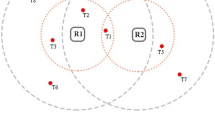Abstract
Even though object identification is its main objective, it is generally accepted that there are some technological challenges that should be addressed in order to exploit the full potential of RFID (Radio frequency identification). The anti-collision problem is one of them. Despite the different proposed methods, it still needs further study on how to improve identification ability. This paper presents a novel algorithm with IDMA (Interleave division multiple access) scheme to resolve the anti-collision problem for RFID. IDMA, which is one of the most promising technologies for high data rate wireless systems, can be regarded as a special case of CDMA (Code division multiple access). In contrast to CDMA, which separates tags by signatures or spreading codes, distinct interleavers are the only means to separate tags for IDMA. In this paper, a RFID based IDMA receiver is proposed and compared to classical systems. Simulation results demonstrate that this system provides an improvement in performance in terms of bit error rate in dense scenarios (large number of tags) and it offers an efficient alternative to systems with classical spreading sequence.





Similar content being viewed by others
References
K. Finkenzeller, RFID Handbook, Fundamentals and Applications in Contacts smart Cards and Identification, Wiley, West Sussex, 2004.
K. Dheeraj, K. W. Chin, and R. Raad, A survey and tutorial of RFID anti-collision protocols, IEEE Transactions on Wireless Communication, Vol. 12, pp. 105–117, 2010.
A. Loeffle, F. Schuh, and H.Gerhauser, Realization of a CDMA based RFID system using a semi active UHF transponder, Proceedings of International Conference on Wired/Wireless Internet Communications, pp. 5–10, 2010.
G. Mazurek, Active RFID system with spread-spectrum transmission, IEEE Transactions on Automation Science and Engineering, Vol. 6, pp. 25–33.
N. Li, X. Duan, and Y. Wu, An anti collision Aagorithm for RFID, International Conference on Wireless Communications, Networking and Mobile Computing, WiCOM 2006, doi:10.1109/WiCOM.2006.338, 2006.
P. Wang, A. Hu, and W. Pei, The design of anti-collision mechanism of UHF RFID system based on CDMA, Proceedings of IEEE Asia Pacific Conference, pp. 1703–1708, 2006.
L. Ping, and W. K. Leung, Interleave division multiple access, IEEE Transactions on Wireless Communication, Vol. 5, pp. 938–947, 2006.
I. Mahafeno, and C. Jego, Reduced complexity iterative multi-user detector for IDMA (interleave division multiple access) system, Proceedings of IEEE Global Telecommunications Conference, (GLOBECOM’06), pp. 1–6, 2006.
K. Kusume, and G. Bauch, Some aspect of interleave division multiple access in ad hoc networks, Proceedings of International Symposium on Turbo Codes and Related Topics, (ISTC’06), 2006.
H. Schoeneich, and P. Hoeher, Adaptive interleave division multiple access—a potential air interface for 4G bearer services and wireless LANs, Proceedings of International Conference on Wireless and Optical Communication Networks (WOCN’04), pp. 179–182, 2004.
A. O. Dahmane, A new MMSE based cascade filter MUD tracking mode in time-varying channels, IEEE Wireless and Mobile Conference WiMob’05, Vol. 1, pp. 30–35, 2005.
A. Hamza, and S. Chitroub, Independent component analysis in IDMA systems, Proceedings of IEEE (NEWCAS-TAISA’09), pp. 1–4, 2009.
R. H. Mahadevappa, J. Proakis, Mitigating multiple access interference and inter symbol interference in encoded CDMA systems with chip-level interleaving, IEEE Transactions on Wireless Communication, Vol. 1, pp. 781–792, 2002.
R. Lupas, and S. Verdu, Linear multiuser detector for synchronous code division multiple access channels, IEEE Transactions on Information Theory, Vol. 35, pp. 123–136, 1989.
Author information
Authors and Affiliations
Corresponding author
Rights and permissions
About this article
Cite this article
Hamza, A., Salut, G. IDMA Based Anti-collision in RFID Networks. Int J Wireless Inf Networks 20, 235–240 (2013). https://doi.org/10.1007/s10776-013-0208-6
Received:
Accepted:
Published:
Issue Date:
DOI: https://doi.org/10.1007/s10776-013-0208-6




